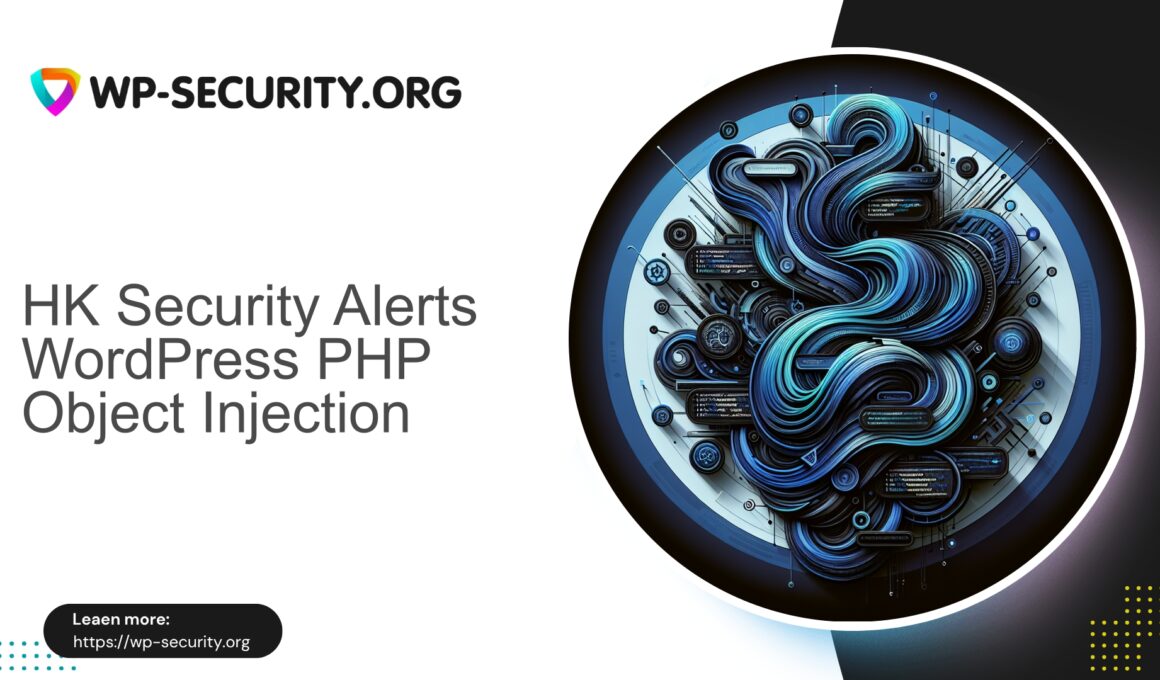| Plugin Name | WordPress Post Grid and Gutenberg Blocks Plugin |
|---|---|
| Type of Vulnerability | PHP Object Injection |
| CVE Number | CVE-2025-54007 |
| Urgency | Medium |
| CVE Publish Date | 2025-08-06 |
| Source URL | CVE-2025-54007 |
Critical Vulnerability Alert: PHP Object Injection in Post Grid and Gutenberg Blocks Plugin (≤ 2.3.11)
Discover the PHP Object Injection vulnerability affecting the Post Grid and Gutenberg Blocks plugin, its impact, and practical steps to reduce risk — written from the perspective of a Hong Kong security expert.
Publish Date: 2025-08-10 | Author: Hong Kong Security Expert
Overview
WordPress powers a large portion of the web and remains a frequent target for attackers. A PHP Object Injection vulnerability has been identified in the Post Grid and Gutenberg Blocks plugin affecting versions 2.3.11 and earlier. This advisory explains the vulnerability, the threat it poses, and practical defensive steps for site owners and administrators.
What is PHP Object Injection?
PHP Object Injection (POI) occurs when an application unserializes attacker-controlled serialized PHP objects without adequate validation. Maliciously crafted serialized objects can trigger PHP magic methods (for example, __wakeup, __destruct) or otherwise influence application state, potentially leading to:
- Remote code execution (RCE)
- SQL injection
- Path traversal and file system access
- Denial of service (DoS)
When deserialization is handled unsafely, attackers can manipulate application logic and escalate impact significantly.
Why This Plugin Is Vulnerable
Versions before 2.3.12 of the Post Grid and Gutenberg Blocks plugin perform unsafe deserialization: they accept and process PHP serialized data with insufficient validation. This allows an attacker to submit a crafted serialized payload which, upon deserialization, can alter object properties and trigger harmful behavior.
Impact and Risks
This vulnerability carries considerable risk. The reported CVSS score for this issue is 8.8 (Medium severity) and the potential impacts include:
- Remote Code Execution (RCE) — attackers may execute arbitrary PHP code on the server.
- Database compromise — potential for SQL injection or data exfiltration.
- File system access — path traversal can expose or modify sensitive files.
- Denial of Service — specially crafted payloads may crash or exhaust server resources.
- Privilege escalation — exploitation chains can amplify privileges when combined with other flaws.
Successful exploitation often depends on the availability of useful POP (Property Oriented Programming) chains within the plugin or the wider application stack, but the presence of the vulnerability itself is significant and actionable for attackers.
Timeline and Disclosure
- Discovery: Reported by a security researcher in early May 2025.
- Early warning: Shared within trusted security communities in August 2025.
- Patch: Plugin developer released version 2.3.12 containing the fix.
- Public disclosure: Information released soon after the patch to allow site owners to act.
Immediate Actions for Site Owners
As a Hong Kong security practitioner advising local and international site operators, the following actions should be taken immediately:
- Update the plugin to version 2.3.12 or later. This is the primary corrective action. Apply updates without delay.
- Deploy Web Application Filtering. If you cannot update immediately, implement web application filtering (for example, host-based mod_security rules or proxy filters) to detect and block malicious serialized payloads targeting deserialization endpoints.
- Monitor logs closely. Check access logs, error logs and application logs for suspicious POST requests, unusual serialized payloads, or unexpected PHP errors.
- Ensure backups are recent and tested. Maintain off-site, versioned backups so you can recover quickly if remediation is needed. Backups are a last-resort recovery measure, not a substitute for patching.
- Apply least privilege. Limit contributor and editor capabilities where possible. Reduce the number of accounts that can interact with plugin endpoints or upload content that might be parsed by plugins.
How Attackers Might Exploit This
Common exploitation methods include:
- Submitting malicious serialized objects via forms or API endpoints processed by the plugin.
- Leveraging compromised low-privileged accounts (e.g., contributor) to send payloads if the plugin accepts input from such roles.
- Combining this issue with other plugin or server misconfigurations to form a POP chain that leads to code execution or data leakage.
Complexity of Exploitation
POI vulnerabilities are challenging to exploit reliably because they typically require discovering or constructing a POP chain — existing classes with magic methods that produce exploitable effects when object properties are controlled. That said, attackers and automated scanners increasingly include generic payloads and techniques to probe for exploitable patterns; therefore, absence of immediate public exploit code does not mean low risk.
Why Delaying Patches Is Dangerous
Automated scanning and botnets constantly search for known vulnerable plugin versions. Typical attack flow:
- Scan the web for sites running the vulnerable plugin version.
- Attempt common or generic payloads targeting the flaw.
- On success, deploy backdoors, malware, or exfiltrate data.
Timely patching closes this window of opportunity and remains the most effective defence.
Key Points Recap
| Vulnerability | PHP Object Injection (unsafe deserialization) |
|---|---|
| Plugin Affected | Post Grid and Gutenberg Blocks |
| Versions | ≤ 2.3.11 vulnerable; 2.3.12+ fixed |
| CVSS Score | 8.8 (Medium) |
| Privilege Required | Contributor-level may be sufficient |
| Primary Mitigation | Update plugin to 2.3.12+, apply filtering and monitoring |
Practical Security Tips
- Enable automatic updates where appropriate to reduce exposure time for critical fixes.
- Implement filtering and input validation on endpoints that accept serialized data — never unserialize untrusted input.
- Perform regular site scans and integrity checks to detect tampering early.
- Limit privileged accounts and review role assignments frequently.
- Monitor access logs for anomalous requests or payloads resembling serialized objects.
- Educate your team on secure coding practices and the risks of unsafe deserialization.
Where to Get Help
If you need assistance, engage a trusted security consultant or reach out to your hosting provider’s security team. For developers, review plugin code paths that call unserialize() and consider safer alternatives such as JSON with strict decoding and explicit validation of input before instantiation.
